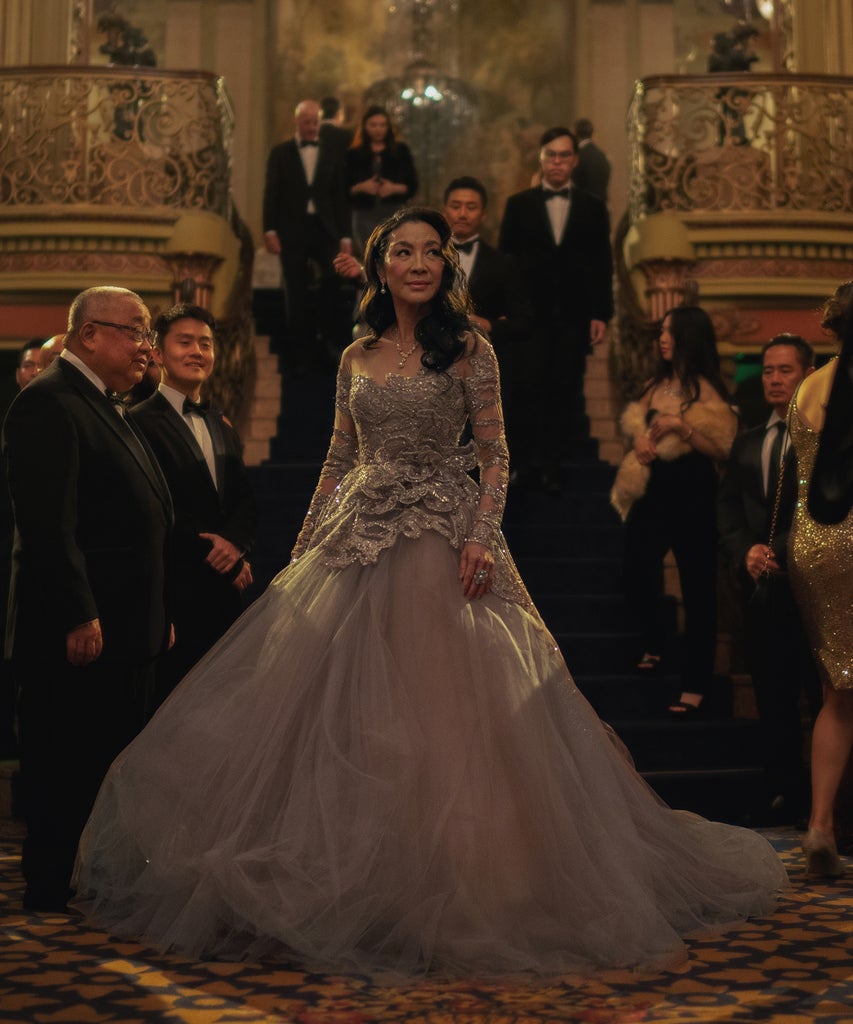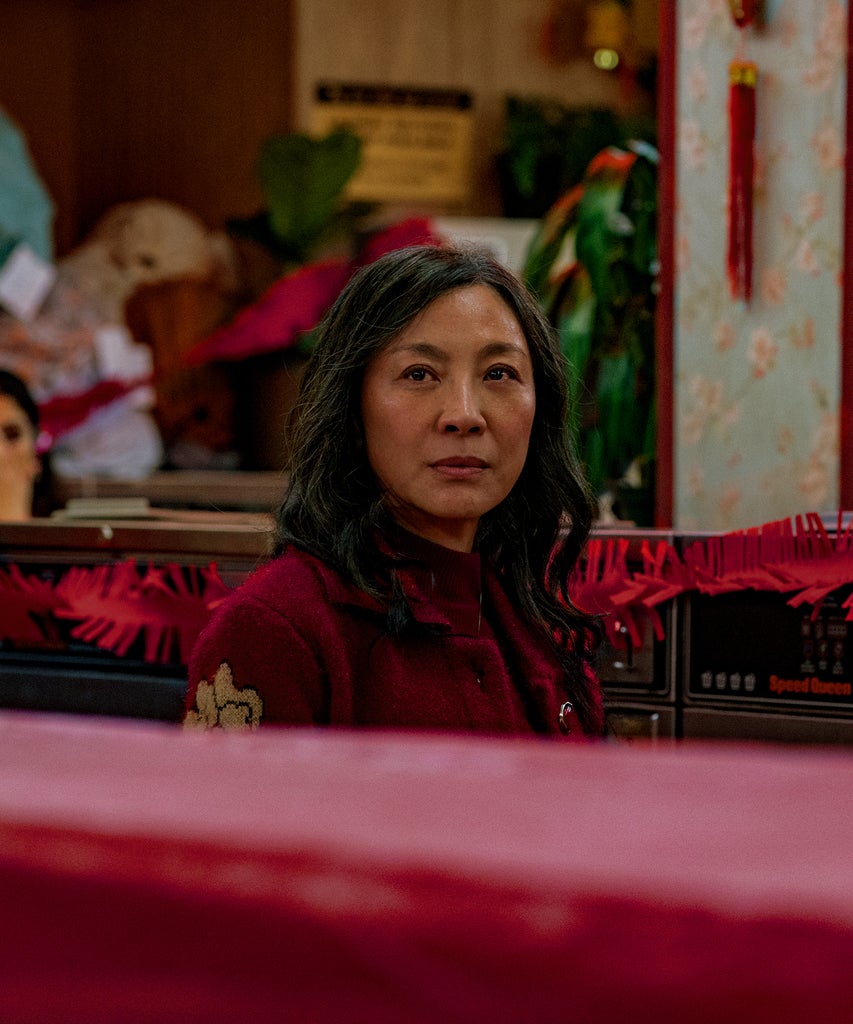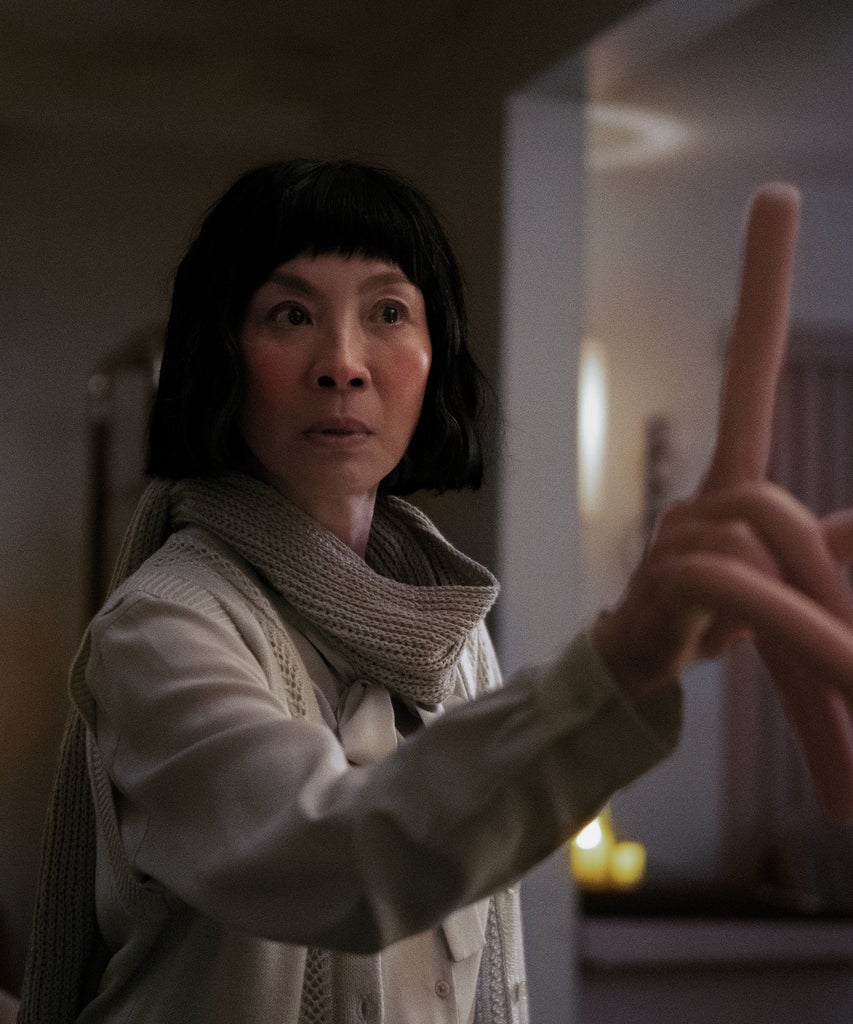
There’s a moment, fairly early into A24’s genre-bending film Everything Everywhere All At Once, when you realize just how meta the Michelle Yeoh-starring movie is. In the scene, Evelyn Wang (Yeoh), a Chinese-American woman who owns and runs a bustling (if in need of an update) laundromat that is being audited by the IRS, has a fractured relationship with her second-gen daughter, and whose friendly-to-a-fault husband wants to file for divorce, is thrust into another universe, One of many that shows all the ways her life could have gone had she made a different choice at different points in her life. Evelyn transports from an IRS building in California to the back of a limo, stepping onto a red carpet as a movie star version of herself attending yet another big premiere.
Yeoh knows what audiences will think when they see the heavy-handed scene, which even uses IRL clips of Yeoh as herself from various star-studded premieres. But she wants to be clear that though this version of Evelyn may look like Michelle Yeoh, she’s not Michelle Yeoh.
“This is a real entity. This is an aging immigrant Asian woman who owns a laundromat and she has a husband and a daughter. Michelle Yeoh doesn’t have all that. So that’s why we have to separate it,” Yeoh tells Refinery29 over Zoom from New York City. Evelyn is also, desperately in search of another life — and isn’t afraid to hurt others in her current one on the quest for it. As she harshly tells her husband after returning from the red carpet universe: “I saw my life without out. I wish you’d seen it, it was so beautiful.”

“Evelyn deserves her own voice,” Yeoh says. “She’s a very ordinary housewife, an immigrant mother who’s trying her very best to survive, trying to ensure this American dream that she had so many years ago was not going to just shatter into pieces, and trying to do her taxes on top of all that.”
Despite the fact that Yeoh is adamant Evelyn’s experience is not actually (or at least not entirely) Michelle’s experience, there’s one point where they do intersect. In many ways, both have been greatly underestimated. Evelyn, by everyone around her, society at large, and even herself who sees unextraordinary ordinariness in her identity as a middle-aged woman. Yeoh, by the movie industry. While Yeoh has had an incredible and storied career, from Yes, Madam! to Tomorrow Never Dies, more recently the actress has primarily had the “privilege of co-starring” in films like Crazy Rich Asians and Memoirs of a Geisha, rather than receive top billing.
“I have not been the first lead in a movie in Hollywood in a long, long time,” she says. The opportunity to helm Everything Everywhere All At Once in a role written for her felt like a recognition that other people realized what she’d long known herself: she can carry a film entirely on her own. Yeoh can do everything. “It was such a relief and a joy to think, My God, I believe that they wrote it for me because it’s encompassing all of the things that I’ve been dying to do, wanting to do, grieving to do.”
It’s a multilayered and nuanced role we don’t often get to see actresses take on later in their careers, as the trajectory of young ingenue to elegant mother-in-law (something Yeoh herself has done) remains pretty consistent.
“Just because you are now an older actress, they think, Oh, no, no, no, no, we should let the guys do all these kinds of things,” Yeoh says. “And thank God the Daniels (writers and directors Dan Kwan and Daniel Scheinert) didn’t think like that. They thought outside of the box — or the universe.” As to be expected, Yeoh kills it, sometimes quite literally, in the film, tackling both the taxing and emotional nuance of circling through numerous genres within one script (as Yeoh told The New York Times Magazine, she used sticky notes to help keep track), as well as meeting the physicality of the role. Despite Evelyn’s continuous morphing, one constant throughout the film is her agility and physical skills, as the different Evelyn’s tap into martial arts to fight other universe-jumping characters. Evelyn hurdles office dividers, engages in hand-to-hand combat (including against a hilarious Jamie Lee Curtis), and even crushes an enemy with the strength of her pinky finger.

For Yeoh, who started her career in martial arts, it was a “pure joy” to return to the screen with a talent that defined the start of her career and her initial roles. “I got a little overwhelmed and emotional when you see [the film] and you watch it and you feel the audience responding in the way [they responded] when I first started my career,” she says. “That was how they were responding; they were thrilled that this young and crazy ass girl was doing all these things that normally the guys would be doing.”
The thrill remained throughout her career and into her seminal role in 2000’s Crouching Tiger, Hidden Dragon. “Now being an older woman and still being able to do that and draw that kind of reaction from not only your fans who have been with you for the last almost 40 years, but now being able to reach out to a much younger audience and get that reaction is like, ‘Yes! Kickass yes.’”
If anything, Yeoh’s own experience shows that there’s power and greatness to be found in those who might be underestimated or overlooked (although anyone underestimating Yeoh in any capacity is seriously mistaken). It’s all about how you look at it. It’s a realization Yeoh shares with her character. In the final scene of the film, after over two hours of surrealist and outlandish experiences, the filmmakers offer one of the movie’s most straightforward and emotional (if not most powerful) scenes, when Evelyn — after almost having her laundromat seized by the IRS and being arrested — faces her daughter Joy (Stephanie Hsu), known as Jobu Tupaki in the other universes and who is out to seek revenge against all the Evelyns in the multiverse, in a frank discussion. Evelyn, up until this point extremely emotionally guarded, tells her daughter that — having seen all the exciting existences she could have had — she chooses the one she’s in, because it’s the one that has her daughter. Evelyn has finally found greatness in her ordinary life through the love of her family.
“The whole script, the movie, was clearly mapped out and planned in this way because at the emotional core, the main heartbeat has always been the truth, the sincerity about love that we have for each other,” Yeoh says. “In all the multiverses, even when Joy was Jobu Tupaki, she always loved her mother; and that she would cross all the universes to look for her mother, she was looking for that connection.”
When Joy, as Jobu Tupaki, tells Evelyn that nothing matters, “that’s the furthest from the truth,” Yeoh says. “Everything matters. And the most important thing that mattered to her was finding her mother again.”
In connecting with her daughter in an alternate universe, Evelyn is able to find greatness in her current, kind of ordinary, one. And that’s a story worth telling on its own.
Like what you see? How about some more R29 goodness, right here?
More Than Visibility, Asians Need To Be Seen
My Mom's Personality Defies Asian Stereotypes
from Refinery29 https://ift.tt/n1VtJuN
via IFTTT
